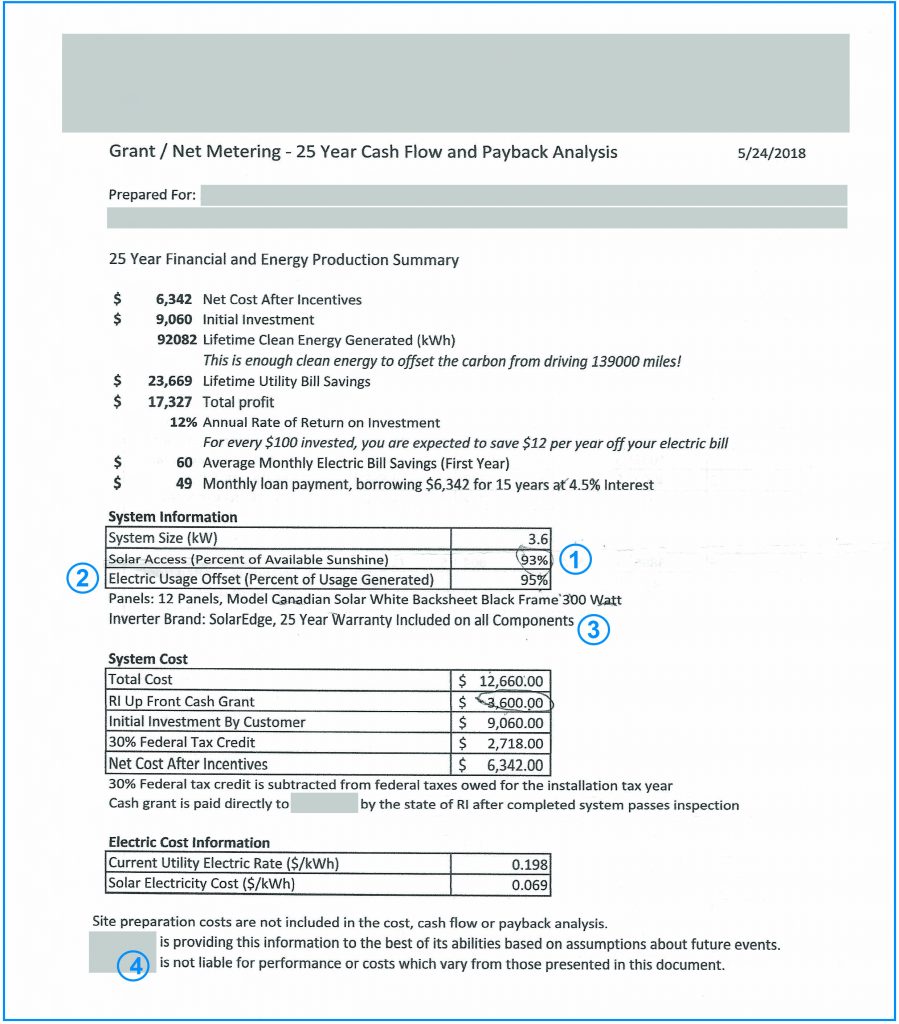I do not believe in bad-mouthing other solar companies. I do believe in helping homeowners make good choices. (Sorry to sound like the mother in Freaky Friday for fans of the film). That means talking to you about some of the bad practices we see in the industry.
Earlier this summer, our solar consultant Todd showed me a proposal a Rhode Island homeowner received from another installer.
At first glance, this proposal seems to have a lot of details. But it doesn’t provide key inputs like the homeowner’s electric usage. How do you know you’ll cover 95% of your usage and thus save $23,669 over a “lifetime” if you don’t know how much electricity that refers to?
Upon closer inspection, the vague promises, lack of detail, and mis-information in this one-page proposal made my head spin. If your proposal looks like this, it’s time to bring out your inner skeptic.
Overstating
 1 – The solar-friendliness of the roof is over-stated, which inflates the amount of solar your roof can produce. Todd’s measurements of the roof suggest its Total Solar Resource Fraction (TSRF) is 85% of ideal. The other installer says the Solar Access is 93%. No reputable installer uses Solar Access, which only addresses shade; they use the TSRF, which factors in shade and roof tilt and roof orientation. Sadly, this installer is either not experienced in solar (I might have made the same mistake myself 12 years ago) or is purposely misleading the homeowner by using the higher Solar Access number.
1 – The solar-friendliness of the roof is over-stated, which inflates the amount of solar your roof can produce. Todd’s measurements of the roof suggest its Total Solar Resource Fraction (TSRF) is 85% of ideal. The other installer says the Solar Access is 93%. No reputable installer uses Solar Access, which only addresses shade; they use the TSRF, which factors in shade and roof tilt and roof orientation. Sadly, this installer is either not experienced in solar (I might have made the same mistake myself 12 years ago) or is purposely misleading the homeowner by using the higher Solar Access number.
(This example proves a point I made in an earlier blog post, Beware the Assumptions in Your Solar Quote, about how small differences in the “inputs” or “assumptions” used in solar proposals can make a big difference in the savings promised in those proposals.)
Underestimating
 2 – It appears they underestimated the homeowner’s electricity use. Todd’s calculations say the roof can fit 17 panels for a 5,600 watt system, which will cover 100% of the home’s electricity needs of 6,467 kilowatt-hours (kWh) a year. The other installer says a 12-panel, 3,600-watt system will cover 95% of the annual usage, which would be 6,144 kilowatt-hours. It’s just not possible for a 3,600-watt system to produce 6,144 kWh of electricity, leading to the conclusion that the installer is vastly understating the home’s annual electricity usage to make their proposal look better.
2 – It appears they underestimated the homeowner’s electricity use. Todd’s calculations say the roof can fit 17 panels for a 5,600 watt system, which will cover 100% of the home’s electricity needs of 6,467 kilowatt-hours (kWh) a year. The other installer says a 12-panel, 3,600-watt system will cover 95% of the annual usage, which would be 6,144 kilowatt-hours. It’s just not possible for a 3,600-watt system to produce 6,144 kWh of electricity, leading to the conclusion that the installer is vastly understating the home’s annual electricity usage to make their proposal look better.
Vagueness
 3 – There is no way in my experience that the warranty information provided can be accurate. “Twenty-five year Warranty included on all Components” is highly unlikely to be true. Does it refer only to SolarEdge? Then what’s the warranty on the panels? It’s just too vague. A good proposal will list the warranties for each major piece of equipment, plus what the installer provides, leaving you no doubt as to what protections come with your system. (Read more on this topic in Solar Warranties – Boring but Necessary.)
3 – There is no way in my experience that the warranty information provided can be accurate. “Twenty-five year Warranty included on all Components” is highly unlikely to be true. Does it refer only to SolarEdge? Then what’s the warranty on the panels? It’s just too vague. A good proposal will list the warranties for each major piece of equipment, plus what the installer provides, leaving you no doubt as to what protections come with your system. (Read more on this topic in Solar Warranties – Boring but Necessary.)
Don’t Look at Me
 4 – Perhaps most concerning is this line tucked at the end: “[Installer] is not liable for performance or costs which vary from those presented in this document.” If your installer won’t hold itself responsible for your system’s performance, or the prices it is charging you, you should be asking why not. Doesn’t sound like they have much faith in their proposal. Neither should you.
4 – Perhaps most concerning is this line tucked at the end: “[Installer] is not liable for performance or costs which vary from those presented in this document.” If your installer won’t hold itself responsible for your system’s performance, or the prices it is charging you, you should be asking why not. Doesn’t sound like they have much faith in their proposal. Neither should you.
Play it Safe
I know people want to go solar quickly, but please, do a little research. Would you trust a car dealership you’ve never heard of? Would you choose an expensive product without getting references from friends or online reviews? Can you trust promises that aren’t in writing?
There are plenty of resources providing tips on choosing an installer, including the articles listed below. An Internet search will turn up others.
Going solar should be an easy and relatively fun process. (I say “relatively” because there are multiple inspections and a few rounds of utility paperwork, but we handle the bulk of that for you.) But play it safe and ask questions upfront.
Make sure any promises are backed up with data, in writing, and that the installer will stand behind them.
If you liked this article, you might also enjoy:
- Shopping for Solar – Don’t Just Focus on Dollars
- Beware the Assumptions in Your Solar Quote
- Why Your Choice of Solar Installer Matters





